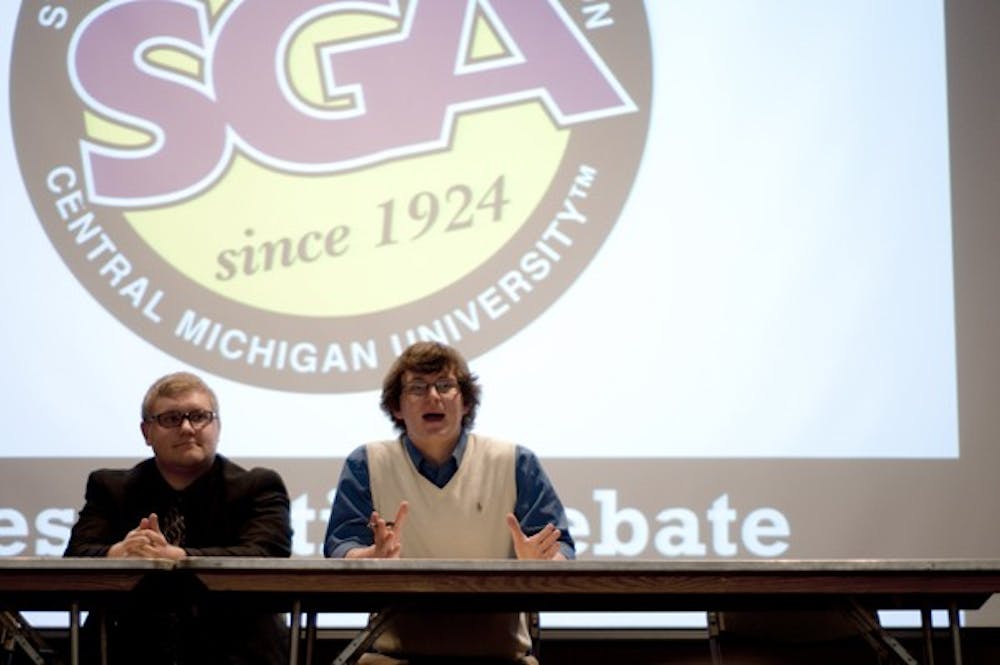Student Government Association presidential debate brings attention to candidates' similarities, differences

Student Government Association presidential candidates squared off in a debate Tuesday night in Anspach Hall 161.
Although there are five presidential candidates running, only four participated in the debate.
Moderated by Assistant Professor of Finance and Law Kenneth Sanney, the debate featured Macomb junior Justin Gawronski, Sparta junior Spencer McKellar, Hesperia senior Killian Richeson and Romeo senior Kevin Richmond. After the debate, Warren senior Connor Gallagher said he was unable to attend because of a family emergency.
All presidential candidates said giving SGA increased relevance to the university is one of their most pressing platforms.
Richmond, who is the only candidate without extensive SGA experience, said his involvement in other organizations on campus gave him a significant advantage in communicating to students about student government.
"The fact that I'm not in the SGA benefits my platform, because I can reach people who are not involved in the SGA, who do not know about SGA," Richmond said. "Because of my involvement and connections to those groups, I can reach RSOs that SGA doesn't usually reach."
McKellar rebutted Richmond, and said his involvements in outside organizations does not make him unique from the other candidates.
"All of us are involved in organizations outside the SGA, and in campaigning we have all met RSOs outside the SGA," McKellar said. "It's not like we all just stay stuck in the SGA and only hear viewpoints from the SGA; we are bringing it from the outside."
McKellar also said Richmond's inexperience in the SGA is not an advantage but, rather, a disadvantage.
"All of us have similar platforms; all of us have similar goals," McKellar said. "But we need someone who knows how to step in and change things right away, and not have to learn the system first."
Gawronski said his administration would work to heavily increase student interest in the SGA.
"We want to make it impossible for you to be apathetic. If you want to be apathetic, you would have to work hard for it," Gawronski said. "We see it as a SGA-wide initiative to increase student interest in the SGA."
Both Gawronski and Richeson signaled interest in starting an SGA newsletter and having senators personally meet the students as methods to gain student relevance, but Richeson said even more is needed.
"You can't just go out and meet people — they have to come to meetings, they have to get involved," Richeson said. "With the experience that I have, I will be able to achieve this."
Candidates also shared sustainability as a high priority in their platforms.
"I feel it is a cultural problem," Garwronski said. "We need a sustainable culture on CMU — we need everyone to feel the same way about the environment as Take Back The Tap and the SEA (Student Enviromental Alliance)."
All of the candidates gave off-campus recycling, a project SGA has been working on extensively for the past two years, as one of their higher environmental priorities. Richeson said he, out of all the candidates, had the most ability to bring the plan into action.
"The biggest problem in the SGA is the disconnect from year to year. We change committee chairs and all the work from the previous year is lost," Richeson said. "I'll be able to continue our work on projects like off-campus recycling from previous years, and not allow that work to be wasted."
Richeson said, if elected, increased funding for student programming would be one of his focuses. He said university funding for student-initiated programs has remained the same since 2001.
"The economy has changed. It's 2012 — the dollar doesn't go as far as it used to," Richeson said. "By increasing funding to things like SBAC funding, the university will be able to bring more events to CMU, better events to CMU and increase student excitement in the university."
In addressing student excitement, Richmond said one of his main focuses would be the football tailgate scene, which has been heavily regulated by the university.
"I was here before tailgating was changed; I remember what it was like earlier," Richmond said. "Obviously I won't be able to change rules which prohibit underage drinking, but by reaching a new middle ground with the authorities on things like no amplified music or no cooking, I will be able to bring new excitement to the scene."
Gawronski closed the debate by saying he was the best candidate to vote for because of his dedication to the race.
"You've got to look specifically at how we run our campaign," Gawronski said. "We are taking this the most seriously. We had all our signatures ahead of time. Some candidates were collecting signatures the day they were due. We have met with all the RSOs, (and) we are the only administration to meet with the deans. We're going to make sure that what you guys want is going to get done, because we have those relationships."
The SGA will hold their vice presidential debate at 6 p.m. March 13 in the Charles V. Park Library Auditorium.
The general elections will be held from March 12-16; students can vote online.



